아이를 적게 낳는 요즘 사람들.
People are having way fewer babies these days.
이런 경향은 다른 어느 나라보다 한국에서 뚜렷하게 나타나고 있는데요.
Nowhere in the world is this more apparent than in South Korea.
초저출생 국가 내 출생률 반등 가능성은 물론 희박하지만 인구 감소의 속도를 늦추고 고령화 비율을 낮추고 있는 나라들에선 우리가 얻을 수 있는 교훈도 있습니다.
Can fertility rates rebound in low fertility countries? It's unlikely but there are still lessons that can be learned from some aging and shrinking countries that have managed to slow down population decline.
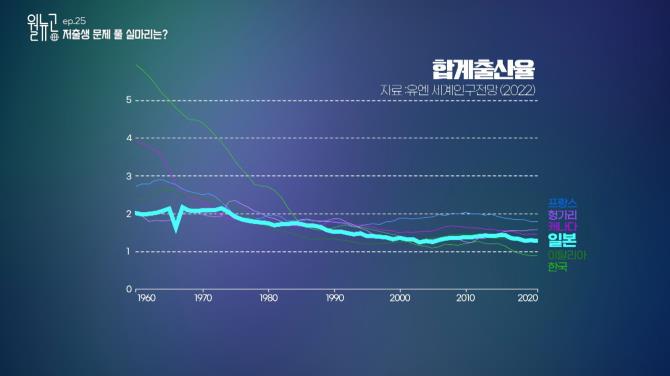
먼저 우리보다 앞서 1970년대 중반부터 저출생을 겪기 시작한 일본을 살펴볼까요.
Japan, the poster child for falling birth rates, has dealt with the issue since the 1970s, long before South Korea took over the headlines.
일본 정부가 선택한 저출생 대책!
바로 다양한 형태의 현금 지원이었습니다. 일부 성과도 있었습니다.
The Japanese government's solution – cash support for families. And it has helped a little.
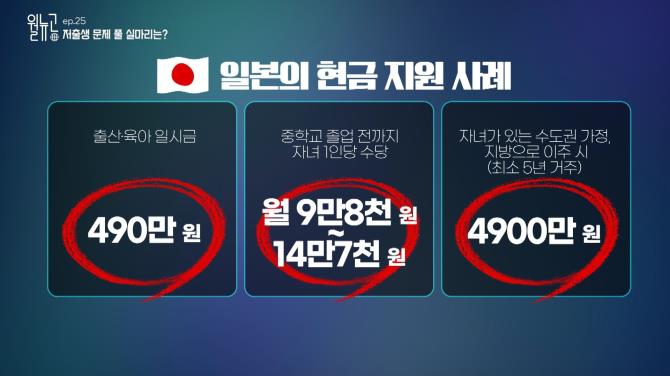
고용노동법 개정 또한 출생률 반등 노력에 있어 필수적인 요소였는데요.
Changing labor laws has also been integral in attempts to revert the fertility rate.
1992년 일본 정부는 최소한의 근로 기준을 충족하는 부모들에게 1년간의 육아휴직을 제공하기 시작했습니다.
In 1992, the Japanese government introduced 1 year of parental leave for parents who meet minimum work requirements.
무급으로 시작했지만 현재 일본 부모들은 육아휴직 기간 동안 월 통상임금의 50~67%를 지급받습니다.
At first it was unpaid. Now parents can receive 50-67% of their regular salary while on leave.
일본 정부는 또 성평등 개선과 저출생 위기 해결을 위해 2023년 아빠들의 육아휴직을 늘리도록 법을 개정했죠.
To promote gender equality and tackle the baby crisis, the government also amended legislation in 2023 to get more fathers to take paternity leave.
기시다 후미오 일본 총리는 남성 육아휴직자 비율을 2025년까지 50%, 2030년까지 85%로 끌어 올리겠다는 목표를 밝히기도 했는데요.
Japanese Prime Minister Fumio Kishida said the goal is to boost the rate of men taking paternity leave to 50% by 2025 and 85% by 2030.
여기에 더해 일본은 노동력 공백을 메우기 위해 외국인 노동자 수용을 점진적으로 확대해 나가고 있습니다.
The country is also trying to fill its labor gaps by gradually taking in more foreign workers.
【 인터뷰 】토마스 소보카 / 비엔나 인구정책연구소 부회장
"동아시아에서 이민은 문화적인 문제로 사회에서 널리 수용되는 개념이 아닙니다. 그렇기 때문에 사람들이 폭넓게 이민을 수용하기까지 적어도 10~20년은 더 걸릴 겁니다. 지금 일본에서 서서히 변화가 일어나고 있듯 말이죠. 그동안 일본은 이민 정책을 꺼려 왔지만 현재 점점 더 많은 이민자들이 일본에 들어와 터를 잡고 있습니다."
【 인터뷰 】Tomas Sobotka / Vienna Institute of Demography and Editor-in-Chief
"In East Asia, this is very much a culture issue and migration is not broadly accepted by the society. So it may still be a matter of one or two or three decades before people start accepting migration in a broader way as it is slowly happening in Japan today. Japan has been always reluctant about immigration and now is increasingly living is the fact that some migrants are coming and staying in Japan forever."
2019년 일본은 '특정기능 비자'를 신설했는데요.
In 2019, it implemented the "Specified Skilled Worker" visa.
*일본 특정기능비자
약 12개 특정산업 분야 업무에 종사하는 외국인을 대상으로 한 비자로 고령화에 따른 노동 공백을 메우기 위해 신설됨
일본 내 180만 명의 외국인 근로자 중 약 146,000 명이 이 '특정기능 비자'로 체류 자격을 부여받았습니다.
Of the 1.8 million foreign workers currently in Japan, around 146,000 have been granted this visa.
그런가 하면 태평양 건너 캐나다의 경우, 이민 정책 활성화를 통한 저출생과 고령화 문제 해결의 사례를 보여주고 있는데요.
Meanwhile, across the Pacific Ocean, Canada is showing how immigration policies can help solve low birth rate and aging population woes.
【 인터뷰 】토마스 소보카 / 비엔나 인구정책연구소 부회장
"4천만 인구를 가진 캐나다는 매년 약 40만 명의 이민자를 받고 있습니다. 그들의 대부분은 활발한 경제활동을 하고 있는데요. 캐나다 경제와 캐나다가 작동하는 데 있어 매우 큰 기여를 하고 있죠."
【 인터뷰 】Tomas Sobotka / Vienna Institute of Demography and Editor-in-Chief
"Canada welcomes 400,000 of migrants every year in a country which has something like 40 million people. Most of them are economically active and most of them very strongly contribute to the Canadian economy, and to the way how Canada functions."
캐나다 연방정부는 2025년까지 140만 명 이상의 추가 이민자 유치를 희망한다고 밝혔습니다.
The Canadian government said it hopes to attract more than 1.4 million new immigrants by 2025.
이민정책은 인구 문제 해결에 도움이 됨에도 불구하고 아직까지 많은 나라들에서 환영받는 저출생 해결책은 아닌데요.
Even though immigration can help with demographic issues, there are still countries that don't see it as a solution.
그 중 헝가리는 반이민 정책을 고수하며 저출생 문제를 해결하려는 대표적인 나라죠.
One of them is Hungary, which is trying to reduce immigration while fixing its low birth rate.
저출생위기 극복 노력의 일환으로 헝가리는 파격적인 출산장려정책을 시행해 오고 있는데요.
Hungary has been tackling its baby crisis with an aggressive family policy.

정책 시행 후 헝가리의 합계출생률. 2010년 1.2%에서 2021년 1.6%로 소폭 상승했습니다.
After it was implemented, this is what happened.
Hungary's total fertility rate rose from 1.2% in 2010 to close to 1.6% in 2021.
【 인터뷰 】조엘 코헨 / 미국 록펠러대 인구학 교수
"다른 많은 나라들은 자녀를 낳으라고 이야기만 줄기차게 하면서 효과는 보지 못하고 있죠. 하지만 헝가리는 국내총생산의 4%, 무려 4%나 되는 예산을 사람들이 아이를 갖도록 하는데 쓰고 있습니다. 그리고 어느정도 성과를 보고 있죠. 출생률이 높아지고 있습니다."
【 인터뷰 】Joel E. Cohen / Head of the Laboratory of Populations at Rockefeller University
"Other countries that talk, talk, talk, have children, have children, have children, no effect. But we know from Hungary, Hungary is spending 4% of its gross domestic product, 4%, to encourage families to have children and they are having some success. The fertility rate is coming up."
하지만 헝가리식 저출생 정책에 좋은 점만 있는 것은 아닙니다. 극우 성향의 빅토르 오르반 총리는 저출생을 해결하기 위한 방안으로서의 이민 수용은 거부하고 있는데요.
But dramatic results don't come without a price.
Prime Minister Viktor Orban, a right-wing nationalist, has openly rejected immigration as a solution to the falling birth rate.
낙태법이 강화되는 등 가족구성원 수를 결정할 수 있는 여성의 선택권 역시 거부당하고 있는 실정입니다.
His government has also tightened abortion laws, taking away from women's right to make choices about family planning.
다자녀 가정의 소득세 면제 등 파격적인 저출생 대책을 검토 중인 곳, 또 있습니다. 바로 이탈리아!
There's another country that's employed family tax benefits and is looking to use controversial measures to boost birth rates. Italy.
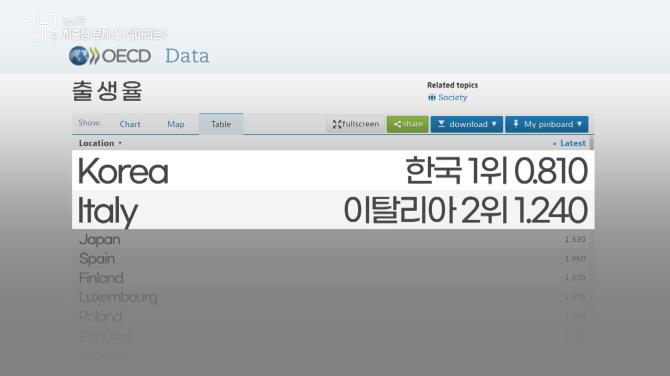
이탈리아의 출생률은 OECD 회원국 가운데 우리나라에 이어 두번째로 꼴찌를 기록중인데요.
It has the second lowest fertility rate in the OECD, after South Korea.
현재 인구수와 1인당 국내총생산(GDP)이 우리와 비슷한 수준인 이탈리아는 유럽에서 저출생 문제로 골머리를 앓고 있는 대표적인 국가죠.
Similar to Korea, in population size and GDP per capita, Italy is also representative of the birth rate crisis, but in Europe.

현재 많은 전문가들이 이탈리아 내 복지와 이민을 늘려야 한다고 강조하고 있지만 최근 장관의 '인종 교체' 발언을 둘러싼 정치적, 사회적 논란까지 불거진 상황에서 이탈리아에서도 이민 확대 정책은 갈 길이 멀어 보입니다.
Many experts believe the Italian government must do more to increase state sponsored welfare and immigration. But politics and social issues surrounding fears of "ethnic replacement" are making it hard to fully open Italy's borders to more foreigners.
【 인터뷰 】토마스 소보카 / 비엔나 인구정책연구소 부회장
정부가 모든 수단과 방법을 동원하지 않은 채 인구 통계의 추세를 바꿀 수 있을 거라고 생각한다면 그것은 큰 오산입니다. 독일이나 이탈리아의 경우만 보더라도 이민이 없다면 인구는 (크게) 감소했겠죠. 하지만 이민자를 받았기 때문에 인구 감소가 천천히 발생하거나 인구가 줄지 않고 있는 것이죠.”
【 인터뷰 】Tomas Sobotka / Vienna Institute of Demography and Editor-in-Chief
"It's also a little bit useless if the government thinks that they can change demographic trends without making all the accommodations which are necessary in the economy and in their policies to respond to these trends. Let's say like Germany or Italy, where the population is, would be decreasing without immigration, but immigration makes it decreasing slowly or not at all."
그런가 하면 저출생 문제를 효과적으로 극복해 온 유럽 국가의 사례도 있습니다. 바로 EU 국가 중 출생률이 가장 높은 프랑스인데요. 프랑스 역시 세계적 추세인 저출생 문제에서 자유롭진 못합니다.
There is a prime example of a country that effectively turned around its baby bust. France, which boasts the highest fertility rate in the European Union. However, it too continues to battle the global problem of falling births.
2022년 출생아 수, 사상 최저를 기록했죠.
하지만 프랑스의 합계출생률은 1.8로 한국 0.78의 약 두 배! 한국과 같은 초저출생 국가에 비하면 아직 행복한 고민을 하고 있는 듯한데요.
In 2022, the number of babies born in France dropped to a historic low. Its total fertility rate remained at 1.8.
프랑스의 출생 장려 정책은 긴 역사를 가지고 있습니다. 부모들의 삶의 질 향상을 통해 출생률을 높이고자 1993년, 가족법을 개정한 것이 그 시작이었죠.
France has a long history of pro-natalist policies. It started in 1939 with the Family Code (Code de la Famille) to increase the population by making parents' lives easier:

프랑스는 가족정책 관련 예산을 GDP의 약 4%에 이르도록 점진적으로 늘렸고, 여성의 경제활동 장려를 위해 가정과 직장의 양립정책을 전면에 내세웠습니다.
France also spends big on family policy, devoting about 4% of its GDP to various measures, including the promotion of women's economic activities and work-life balance.
1946년 이후 가족 수당과 부모 수당을 일 하는 모든 프랑스인은 물론, 외국인 이민자들에까지 제공해오고 있죠.
Since 1946, the French government has provided family allowances and prenatal allowances to all French citizens and foreigners.
이런 프랑스의 저출생정책과 그에 따른 성과는 다른 유럽 국가들에 참고 사례가 되며 일명 '프랑스적 예외'로 불리게 됐습니다.
Such policies and the influence they've had on countries observing from afar have made the European state a fertility model, a so-called French exception.
저출생 문제 극복을 위한 각 나라들의‘피 땀 눈물…’
For countries to fix their birth rate problems it'll require a lot of effort and hard work.

이들의 성공과 실패 사례를 통해 우리가 배울 점도 분명히 있겠죠?
Through all the successes and failures, we're bound to find sustainable solutions.
【 인터뷰 】스튜어트 지텔-바스텐 / UAE 칼리파대 인문사회과학 교수
"모든 나라가 높은 세금을 토대로 한 다양한 복지시스템을 갖추고 다양한 가족 지원 정책을 마련하고, 양성평등 사회로 전환하는 것이 가능할까요? 그건 불가능합니다. 그렇기 때문에 저출산 문제 해결에 어려움을 겪는 나라가 할 수 있는 건 전 세계 다른 지역의 다양한 좋은 정책의 사례를 참고하는 겁니다."
【 인터뷰 】Stuart Gietel-Basten / Professor of Humanities and Social Sciences
Khalifa University of Science and Technology
"Can every country just switch over to having a high tax system, lots of family policy, lots of social policy, and kind of change their culture relating to gender equality? You can't do it like that. It's not possible. So what you can do is take good examples from all different parts of the world."
[인터뷰]
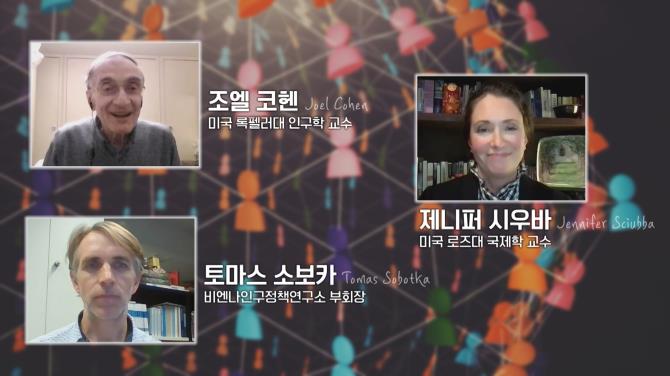
△ 조엘 코헨 (Joel Cohen)
-미국 록펠러대 인구학 교수
-미 컬럼비아대 인구학 교수
-록펠러대 & 컬럼비아대 인구연구소 소장
-미 외교협회 (CFR) 회원
-1999 미 타일러상 수상
-미 하버드대 응용수학, 인구학 박사
△ 토마스 소보카 (Tomas Sobotka)
-오스트리아 비엔나인구정책연구소 부회장
-빈 인구연구소(VID) 책임자
-네덜란드 흐로닝언대학교 인구통계학 박사
-유럽인구학회(EAPS) 소속
-2017 알리안츠 유럽 인구통계학자상 수상
△ 제니퍼 시우바 (Jennifer Sciubba)
-미국 로즈대 국제학 교수
-미 싱크탱크 윌슨센터 연구원
-미 국제전략문제연구소(CSIS) 선임연구원
-'8 Billion and Counting' 저자
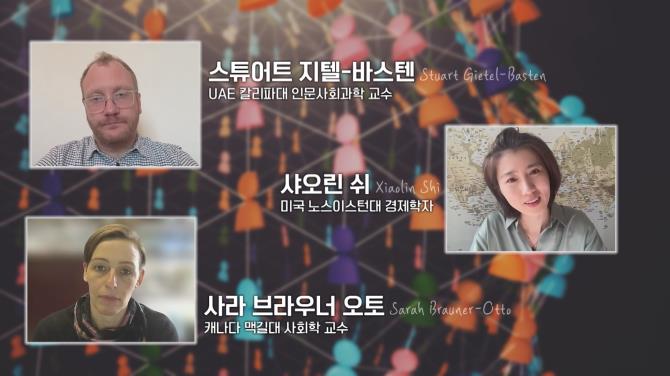
△ 스튜어트 지텔-바스텐 (Stuart Gietel-Basten)
-UAE 칼리파대 인문사회과학 교수
-前 홍콩과학기술대 사회과학·공공정책학 교수
-영국 케임브리지대 역사인구학 박사
-'Why Demography Matters' 저자
△ 사라 브라우너 오토 (Sarah Brauner-Otto)
-캐나다 맥길대 사회학 교수
-인구구조 연구소 소장
-미국 미시건대 사회학 박사
△ 샤오린 쉬 (Xiaolin Shi)
-미국 노스이스턴대 경제학자
-Learning Lab International 공동 창립자
-Ciprun Global, Inc 연구 책임자
-前 스테이트 스트리트 글로벌 어드바이저(SSGA) 전략연구원
취재·구성: 박로진, 안미연, 정혜련
연출: 최인정
촬영: 차지원, 전인제
CG: 김지현, 이슬
음악: 김동현
#저출생 #저출산 #인구감소 #일본 #프랑스 #이탈리아 #캐나다 #헝가리 #대한민국 #고령화 #월드뉴스공장 #월뉴공 #월드 #뉴스공장 #ON세계 #TBS #TBS국제뉴스 #특파원 #해외반응 #외국인 #박로진 #안미연 #정혜련 #기자